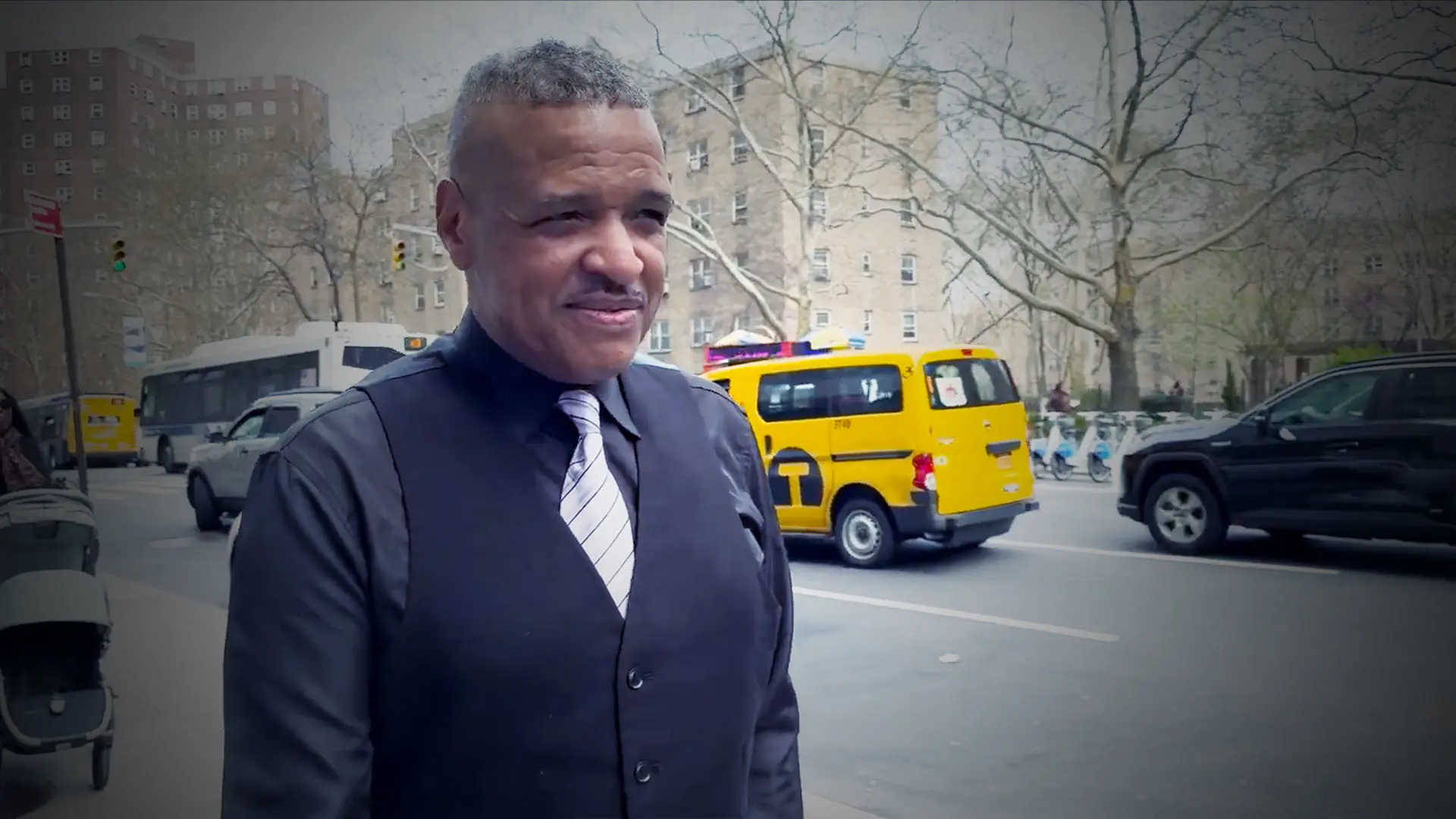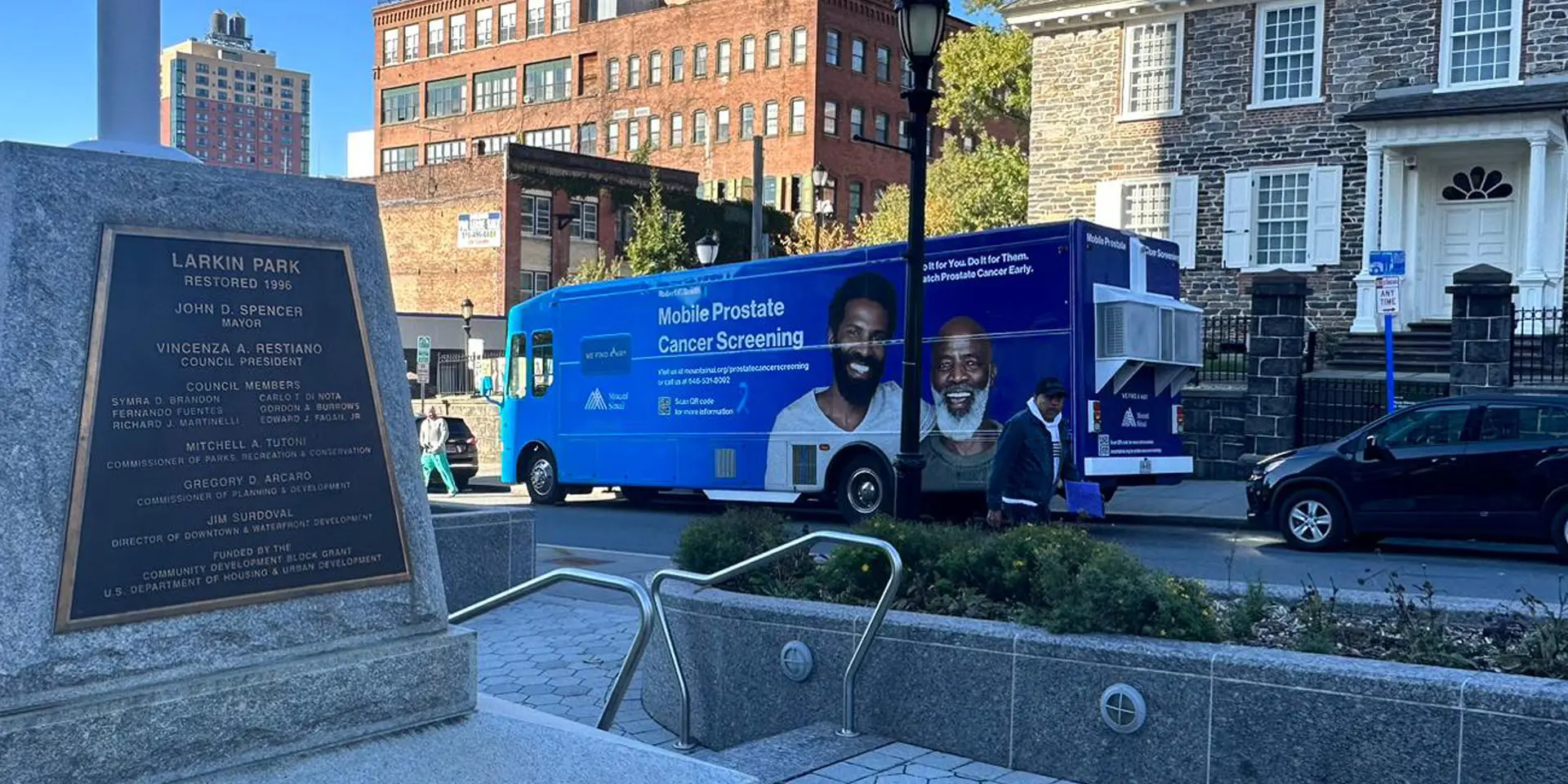
The Mount Sinai Robert F. Smith Mobile Prostate Cancer Screening Unit visits neighborhoods across New York City, providing access to education and screening for all who visit.
Committed to changing the trajectory of prostate cancer among New York City’s highest at-risk population, the Mount Sinai Robert F. Smith Mobile Prostate Screening Unit is living up to its vast promise. Launched in April 2022 by the visionary Ash Tewari, MBBS, MCh, FRCS (Hon.), DSc (Hon.), the easily identifiable sky-blue van screened 8,861 men by December 2024, quadrupling its first-year volume while logging some 15,000 miles across 539 community screening events and sites.
Funded by a generous $3.8 million donation from philanthropist Robert F. Smith, based on a proposal spearheaded by Dr. Tewari, the Mount Sinai Robert F. Smith Mobile Prostate Screening Unit is dedicated to addressing prostate health disparities. With a specific focus on educating Black men about prostate health and providing life-saving screenings and referrals for treatment, the initiative aims to reduce prostate cancer deaths among Black males by 25 percent in the communities surrounding The Mount Sinai Hospital and Mount Sinai Queens.
“As the numbers show, our program has been extremely well received by the community, particularly Black men who face a significantly greater risk of prostate cancer and yet are often hesitant to getting tested,” says Dr. Tewari, Professor and Chair of the Milton and Carroll Petrie Department of Urology at the Mount Sinai Health System. “That success has encouraged us to continually expand the program with the goal of eventually reaching a million men, which we believe will happen with the help of collaborations and even an international presence, which we’re working to put in place.”
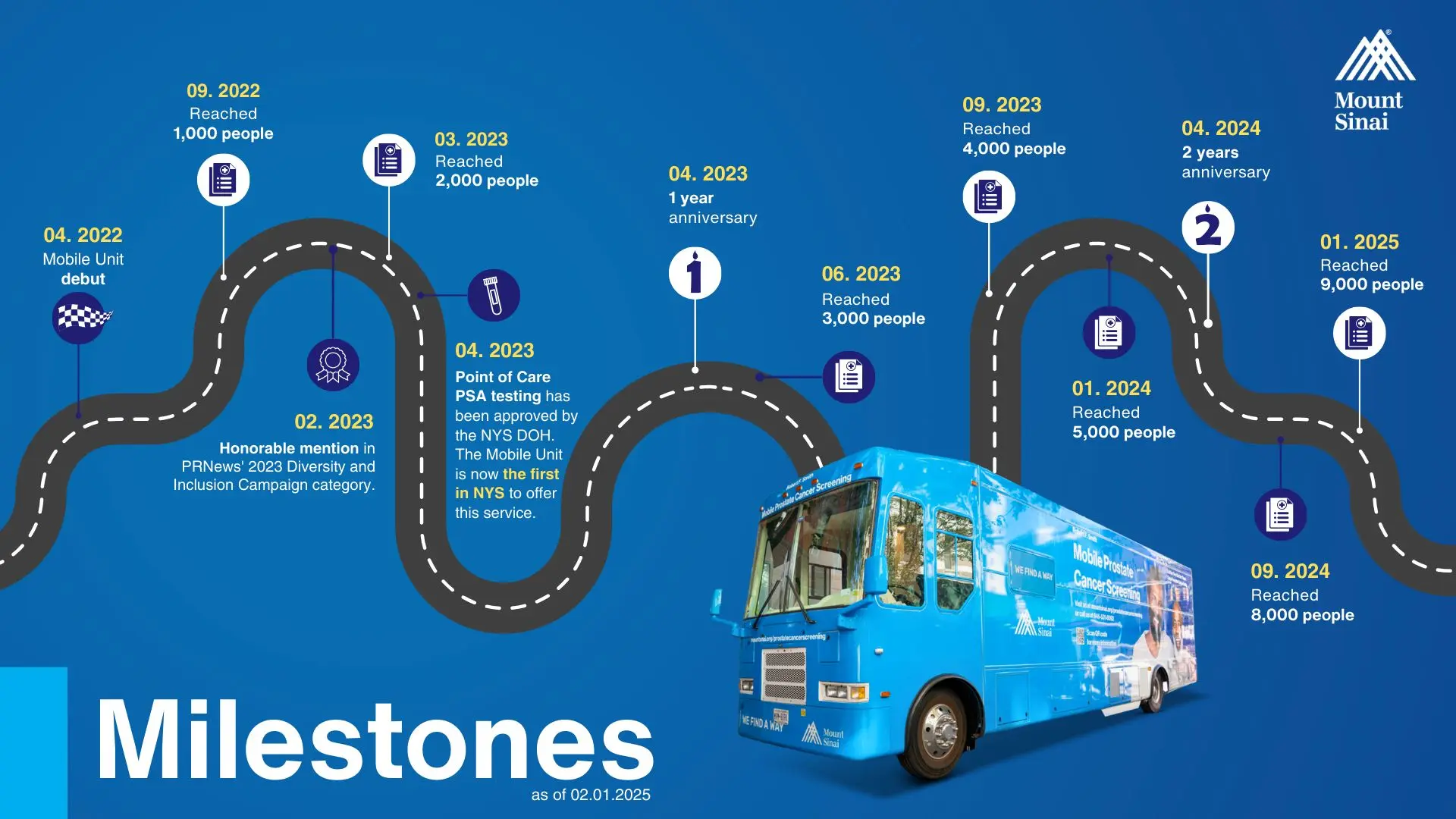
The Mount Sinai Robert F. Smith Mobile Prostate Screening Unit has logged some 15,000 miles across 539 community screening events and sites.
Dr. Tewari says the mobile unit is serving a critical function: bringing needed medical screening and a process of shared decision-making to an underserved community. Dr. Tewari is also Chair of Urology,The Mount Sinai Hospital;
Director of the Center of Excellence for Prostate Cancer at the Tisch Cancer Institute, Icahn School of Medicine at Mount Sinai; and Surgeon-in-Chief of the TischCancer Hospital at The Mount Sinai Hospital.
Collaboration remains key to this effort. By partnering with organizations and the broader medical community, the initiative builds on the program's proven success, which has already screened more than 6,000 Black men, one of the most at-risk populations.
“We need to make sure we’re catching these individuals early to ensure the best possible outcomes,” Dr. Tewari says. “Screening for prostate cancer can’t be a one-time event for men; it must be done regularly. The traditional brick-and-mortar approach is not necessarily the best way to accomplish that goal. As health professionals, we must go out and engage the community to win its trust. Our mobile screening unit has been a great step in that direction, but we know our work is just beginning.”
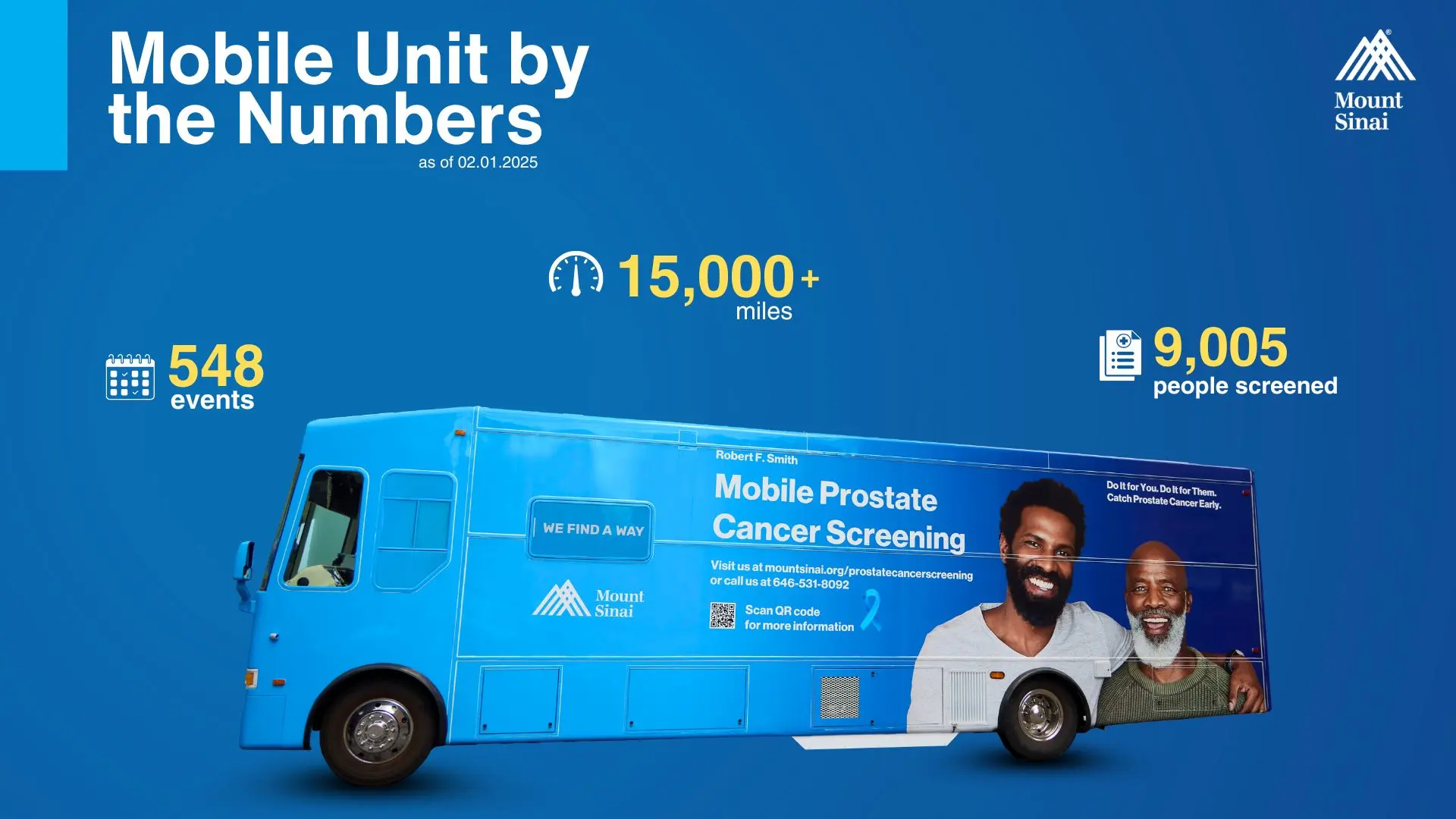
Funded by a generous $3.8 million donation from philanthropist Robert F. Smith, the Mount Sinai Robert F. Smith Mobile Prostate Screening Unit is dedicated to addressing prostate health disparities. It has sceened more than 9,000 people, and its success has resulted in plans for expansion.
Building on this momentum, the “Million Strong Men Initiative” seeks to transform prostate cancer screening on a global scale. The program aims to expand internationally, with new mobile units planned for Atlanta and Delhi, India.
“Our objective is simple: to safeguard fathers, brothers, and sons. One PSA test holds the power to rewrite futures, guaranteeing countless cherished moments at family gatherings,” says Dr. Tewari. “We have invested in education and shared decision-making processes that help patients in making a decision for further imaging and biopsy.”
The initiative is guided by a mission to raise awareness, enlighten communities, and prioritize proactive prostate cancer screening while emphasizing shared decision-making that respects patients' values and preferences. “This collective effort will empower men with knowledge about risk factors, highlight the critical importance of early detection, and deliver personalized intervention strategies that align with individual needs,” Dr. Tewari says.
The expansion of Mount Sinai’s mobile prostate screening program is marked by an exciting new partnership in Atlanta. Thanks to an agreement with Emory Health and funding from the Arthur M. Blank Family Foundation, a state-of-the-art mobile unit, modeled to the exacting standards of Mount Sinai’s original vehicle, will soon serve the Atlanta community. Mount Sinai will supply the van, oversee operations, and ensure the same high-quality health care services are consistently delivered.
This collaboration represents a significant step in Mount Sinai’s goal to expand access to life-saving screenings. Discussions are also underway to bring similar initiatives to other cities across the United States and internationally.
Beyond prostate cancer, the mobile unit serves as a critical gateway to identifying other medical conditions such as incontinence, bladder cancer, and kidney disease—ailments often overlooked in populations with limited access to health care.
“Our unit is staffed by an experienced clinical team that takes patients’ vital signs, collects medical histories, and assesses a wide range of symptoms that may require follow-up care, even when the PSA results are normal,” says Safia Khan, Director of Network Operations and Innovation for the Mount Sinai Health System. Ms. Khan oversees the program’s operations, including collaboration with community partners. The mobile unit’s comprehensive capabilities include blood tests for infection, bladder scans, rectal exams, and genetic testing, providing a robust approach to patient care.
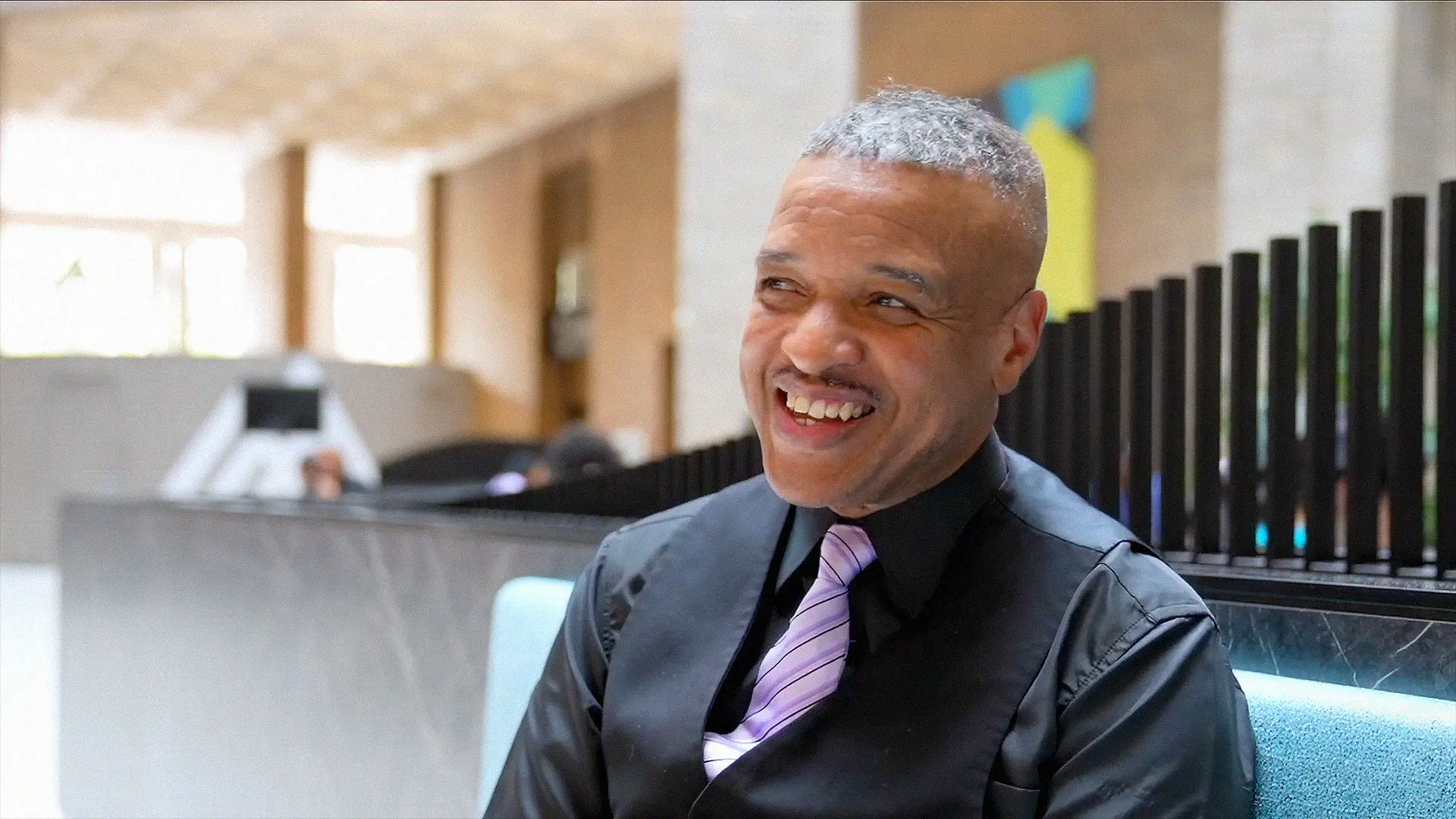
"I would say this to everyone: If you see one of these mobile vans in your neighborhood, go in and get tested," says Virgil Kizer, 65, a security officer with the Fire Department of New York City who had avoided a prostate test for 10 years until the mobile unit visited his workplace. "I’m truly grateful for the fact it allowed me to catch my cancer at a stage when it was still treatable. I know that decision saved my life.”
As part of its growing outreach, the multidisciplinary team works closely with local churches, health centers, and community organizations to enhance awareness, education, and access to quality care. Alongside the core team, additional Mount Sinai health care providers contribute to the van’s efforts in local neighborhoods, ensuring a broader impact.
One individual profoundly affected by the program is Virgil Kizer, a security officer with the Fire Department of New York City. After a decade-long lapse in prostate testing, Mr. Kizer seized the opportunity when the mobile unit visited his workplace.
“They took a blood sample, and it came back positive for prostate cancer,” recalls Mr. Kizer, 65, who subsequently received treatment from Dr. Tewari. “Fortunately, they told me it was treatable, and after the surgery I had at Mount Sinai, I was back to my regular lifestyle, free of cancer. I would say this to everyone: If you see one of these mobile vans in your neighborhood, go in and get tested. I’m truly grateful for the fact it allowed me to catch my cancer at a stage when it was still treatable. I know that decision saved my life.”
